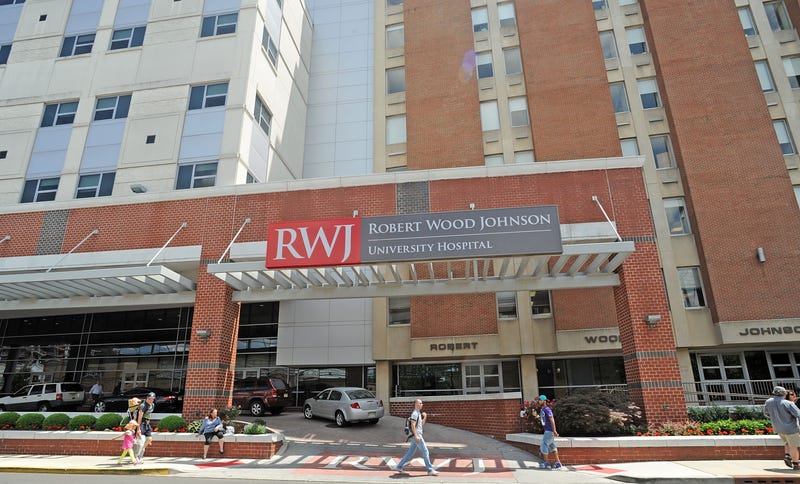
NEW BRUNSWICK, NJ (1010 WINS) -- As the Robert Wood Johnson University Hospital nurses’ strike enters its fourth week, little progress has been made between the union and the New Brunswick, NJ hospital. Nurses say that the government’s professedly neutral stance on the strike has only further prolonged it.
Since Aug. 4, over 1,700 registered nurses have picketed across the street from the hospital, after rejecting a tentative agreement. Union representatives claim the nixed agreement didn’t address the shortage of staff, which has forced nurses to spread their care thin across several patients in a shift. The most recent round of negotiations, held last Wednesday, stalled out with neither side giving in to the other’s demands.
“We had given our proposal a week earlier, and the hospital rejected it,” said registered nurse Judy Danella in an interview with 1010 WINS last Friday. Danella has been at RWJ since 1995, and as president of the United Steelworkers Local 4-200 union for healthcare workers, she has led her side in negotiations with the hospital.
“We just want pure safe staffing guidelines, and they were not in agreement with that,” Danella added. She alleged that the hospital wasn’t willing to adhere to these guidelines when nurses called out sick, and dealt with the lack of personnel by penalizing staffers for taking days off.
Since day one of the strike, RWJ has hired over 1,000 replacement nurses with “the highest level of certification” and specialties in acute care. The hospital reports that it has already spent a combined $25 million for the new fleet of nurses, money they say could be better invested in staff wages, patient care, and improvements to the hospital.
As the union and hospital’s stalemate over the rejected proposals continue, the New Jersey government has expressly stated that it isn’t picking sides.
Danella believes that the government’s stance of neutrality comes in part from the size of the RWJBarnabas Health Group: since the merger between Robert Wood Johnson and Barnabas in 2016, the network has extended to 17 hospitals across New Jersey and has over 37,000 employees and 9,000 physicians. The impact of this strike would ripple across the entire state, including in hospitals that might not be able to abide by the same guidelines as RWJ.
Down the block in New Brunswick, the April 2023 strike between Rutgers faculty unions and the school administration was resolved in a tentative agreement within five days, owing in part to Gov. Phil Murphy’s “intensive” efforts in the negotiations. However, the New Jersey government has taken more of a back seat in the RWJ labor dispute, which hasn’t drawn much closer to a conclusion.
Danella contrasted the New Jersey government’s involvement in the nurses’ strike with the New York government’s proactive role in the Jan. 2023 nurses’ strike at NYC’s Mount Sinai and Montefiore hospitals. After just three days of striking, nurses ratified contracts to solidify mutually fairer staff-to-patient ratios, and to be financially compensated whenever their hospital didn’t abide by the staffing guidelines.
“When you look at the New York strike of nurses, they had the Attorney General Letitia James front and center…the governor Kathy Hochul was there. All of them supported the nurses,” Danella pointed out. “We are not getting the same support from our government officials.”
In the past weeks, New Jersey politicians have come out to rallies to speak ー among them Rep. Frank Pallone (D-06), who joined the nurses on the picket line on Friday ー but they’re all upfront about remaining officially neutral.
“I’ve been a longtime advocate for union workers, who are the backbone of our communities in New Jersey and around the country,” Pallone said at the picket line.
“Every day, nurses work hard to keep us healthy and safe, and they deserve pay and benefits that reflect their important role.”
As the strike progresses, the USW has set up a fund to continue health coverage for the workers, many of whom have successfully filed for unemployment. The fund ensures that the striking workers remain financially secure through at least September.
The labor dispute now risks bleeding into the upcoming school year at Rutgers. Among other concerns, the strike may impact the availability of students’ clinicals, for which the university often asks for the help of visiting RWJ nurses.
Still, the nurses aren’t willing to suspend the strike. They pledge to continue picketing “24/7,” across the street from the hospital in the day, and occupying the emergency rooms starting at 8 p.m. each night.
“We will continue to picket until we sit down and we negotiate, when we can get a contract,” Danella said.


